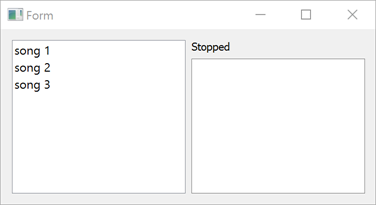A Qt Quick application that sends data to and receives it from a compiled ECMAScript data model.

Media Player QML Example (Static) demonstrates how to access data from an ECMAScript data model that is compiled into a C++ class.
UI 是使用 Qt Quick 创建的。
要运行范例从 Qt Creator ,打开 欢迎 模式,然后选择范例从 范例 。更多信息,拜访 构建和运行范例 .
We specify the data model as a value of the
datamodel
属性在
<scxml>
element in
mediaplayer-common/mediaplayer.scxml
:
<scxml
xmlns="http://www.w3.org/2005/07/scxml"
version="1.0"
name="MediaPlayerStateMachine"
initial="stopped"
datamodel="ecmascript"
>
<datamodel>
<data id="media"/>
</datamodel>
We link against the Qt SCXML module by adding the following lines to the example's build files.
QT += widgets scxml
接着,指定要编译的状态机:
STATECHARTS = ../mediaplayer-common/mediaplayer.scxml
find_package(Qt6 COMPONENTS Core Gui Widgets Scxml)
target_link_libraries(mediaplayer-widgets-static PUBLIC
Qt6::Core
Qt6::Gui
Qt6::Scxml
Qt6::Widgets
)
接着,指定要编译的状态机:
qt6_add_statecharts(mediaplayer-widgets-static
../mediaplayer-common/mediaplayer.scxml
)
The statechart directives
STATECHARTS
or
qt6_add_statecharts
invoke the Qt SCXML Compiler,
qscxmlc
, which is run automatically to generate a header and a source file, which are then added appropriately for compilation.
We instantiate the generated
MediaPlayerStateMachine
class in
mediaplayer-qml-static.cpp
:
#include "mediaplayer.h" int main(int argc, char *argv[]) { QGuiApplication app(argc, argv); qmlRegisterType<MediaPlayerStateMachine>("MediaPlayerStateMachine", 1, 0, "MediaPlayerStateMachine"); QQmlApplicationEngine engine; engine.load(QUrl(QStringLiteral("qrc:///mediaplayer-qml-static.qml"))); if (engine.rootObjects().isEmpty()) return -1; return app.exec(); }